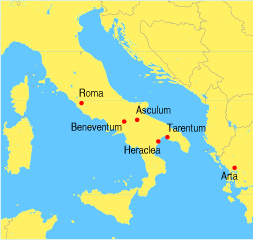Battle of Heraclea
| Battle of Heraclea | |||||||
|---|---|---|---|---|---|---|---|
| Part of the Pyrrhic War | |||||||
 Battle sites and places of the Pyrrhic War |
|||||||
|
|||||||
| Belligerents | |||||||
| Roman Republic |
Epirus, Magna Graecia |
||||||
| Commanders and leaders | |||||||
| Publius Valerius Laevinus | Pyrrhus of Epirus | ||||||
| Strength | |||||||
| 45,200 | 31,500 infantry, 4,000 cavalry, 20 war elephants |
||||||
| Casualties and losses | |||||||
| 7,000 killed and 7,000 taken prisoner | 4,000 killed | ||||||
The Battle of Heraclea took place in 280 BC between the Romans under the command of consul Publius Valerius Laevinus, and the combined forces of Greeks from Epirus, Tarentum, Thurii, Metapontum, and Heraclea under the command of Pyrrhus king of Epirus.
Tarentum was a Greek colony, part of Magna Graecia. The members of the leading faction in Tarentum, the democrats under Philocharis or Ainesias, were against Rome, because they knew that if the Romans entered Tarentum the Greeks would lose their independence. The Greeks in Tarentum had grown afraid of Roman expansion after the Third Samnite War. After the surrender of the Samnites in 290 BC, the Romans founded many colonies in Apulia and Lucania, the most important of which was Venusia. In 282 BC, after a battle against the Samnites, Lucanians, Bruttians and Thurii, Roman troops entered the Italian Greek colonies of Croton, Lokroi, and Rhegium. Democrats from Tarentum knew that as soon as Rome finished its war with the Gauls, Lucanians, Etruscans, Samnites, and Bruttians, they would enter Tarentum. Another event that concerned the Tarentines was that the aristocratic faction of Thurii that had taken power had invited a Roman garrison into their city; the Tarentines, who had been the referents of all the Magna Graecia colonies, were deeply worried about this fact.
...
Wikipedia
